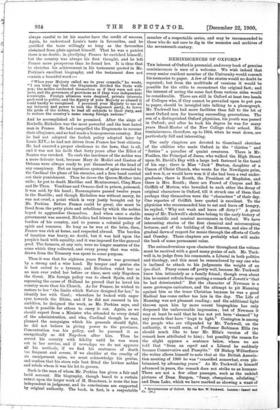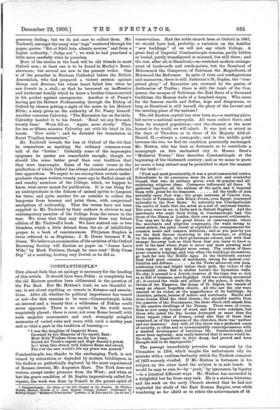REMINISCENCES OF OXFORD.* Tan interest of Oxford is perennial, and
every book of genuine reminiscences is sure of a welcome. We wish indeed. that every senior resident member of the University would commit his memories to paper. A few of the stories would no doubt be repeated; but from the multitude of versions it would be possible for the critic to reconstruct the original fact; and the interest of seeing the same fact from various sides would be considerable. There are still in Oxford at least two heads of Colleges who, if they cannot be prevailed upon to put pen to paper, should be inveigled into talking to a phonograph. Mr. Tuckwell has had more facilities than fall to the lot of most Oxford men for knowing succeeding generations. The son of a distinguished Oxford physician, his youth was passed in Oxford; and after he took his degree he was for many years Head-Master of the New College choir schooL His reminiscences, therefore, up to 1864, when he went down, are particularly full and interesting.
The early chapters are devoted to thumbnail sketches of the oddities who made Oxford in the " thirties " and " forties " a paradise of quaint creatures. There is Mr. Foulkes, the Principal of Jesus, who walked the High Street upon St. David's Day with a large leek fastened in the tassel of his cap ; there is Miss "Jack" Burton, daughter of a Canon of Christ Church, who wrote for the Newdigate prize, and won it, or would have won it if she had been a real under- graduate; there is Routh, the President of Magdalen, and there is Mrs. Routh ; there are Frowd of Corpus and Mo Griffith of Merton, who bewailed to each other the decay of original characters in Oxford, till it struck one of them that perhaps they themselves were the " characters " of their day. One repartee of Griffith here quoted is excellent. To the physician who recommended him to eat and leave off hungry, he replied, " Why not wash and leave off dirty ? " A great many of Mr. Tackwell's sketches belong to the early history of the scientific and musical movements in Oxford. We have interesting stories of the first chemical and microscopical lectures, and of the building of the Museum, and also of the gradual dawn of respect for music through the efforts of Corfe and Ouseley. These chapters are probably what will make the book of some permanent value.
The animadversions upon character throughout the volume must be received with a good many grains of salt. Mr. Tuck- well is, to judge from his comments, a Liberal in both politics and theology, and this must be remembered by any one who is inclined to attach to his judgments the weight of an ipse dint. Pusey comes off pretty well, because Mr. Tuckwell knew him intimately as a family friend; though even about him he cannot refrain from quoting a remark of Jowett's "that he had deteriorated." But the character of Newman is a mere grotesque caricature, and the attempt to pit Manning against him as the truer Christian because he was a good Radical has come rather too late in the day. The Life of Manning was not pleasant reading; and the additional light thrown upon him by more recent biographies has only deepened the unfavourable impression; but of Newman it may at least be said that he has not yet been "shamed" by any records that have " leapt to light" Conington is among the people who are vilipended by Mr. Tuckwell, on the authority, it would seem, of Professor Robinson Ellis (we should much like to hear Mr. Ellis's version of the remark here attributed to him) ; but possibly the reason for the slight appears a sentence below, where we are told that "from an esprit and a Liberal he suddenly became Conservative and Puseyite." Of Bishop Wilberforce the writer allows himself to note that at the British Associa- tion meeting of 1860 he was " crassified somewhat, even ple- beianised, by advancing years." As Mr. Tuckwell is himself advanced in years, the remark does not strike us as humane. There are not a few other passages, such as the unkind pictures of Dean Burgon, "fussy, obsequious, adulating," and Dean Lake, which we have marked as showing a want of
• Reminiscences of Oxford. By the Bev. W. Tuckwell. London : Cassell and Co. [sa]
generous feeling ; but we do not care to collect them. Mr. Tuckwell, amongst the many wise "tags" scattered through his pages, quotes " Est et fideli tuta silentio mercer," and from a higher authority, " Judge not " ; we wish he had practised a little more carefully what he preaches.
Most of the stories in the book will be old friends to most Oxford men ; at least one is to be found in Mozley's Remi- niscences; but several are new to the present writer. One is of the preacher in Durham Cathedral before the British Association, who had prepared a violent sermon against Essays and Reviews, but whose heart failed him when he saw Jowett in a stall ; so that he borrowed an inoffensive and irrelevant homily which he knew a brother-Canon carried in his pocket against emergencies. Another is of Pusey's having got his Hebrew Professorship through the Bishop of Oxford by chance getting a sight of the notes in his Hebrew Bible ; a story given on the authority of Dr•. Pusey himself. Another concerns Calverley. "The Excursion lay on the table. Calverley handed it to his friend : Read me any five-and- twenty lines.' Wren did so. ' Again, more slowly.' Then for ten or fifteen minutes Calverley sat with his head in his hands. ` Now write' ; and he dictated the translation in fluent Virgilian hexameters."
Mr. Tuckwell bewails the loss at Oxford of the wit that he remembers as marking the ordinary common-room talk of the "forties." Certainly some of the impromptu epigrams he quotes are remarkable enough; though we should like some better proof than oral tradition that they were impromptu. Some of the comic verses in the production of which Oxford has always abounded are collected into appendices. We regret to see among them certain under- graduate rhymes written twenty years ago in Balliol about all and sundry members of the College, which, we happen to know, were never meant for publication. It is one thing for an undergraduate in the fulness of animal spirits to lampoon his tutor, and quite another for an outsider to collect the lampoons from hearsay and print them, with conjectural ascriptions of authorship. That the verses have not been supplied to Mr. Tuckwell by their authors is obvious to any contemporary member of the College from the errors in the text. We trust that they may disappear from any future edition of Mr. Tuckwell's book. We have noticed one or two blunders, which a little detract from the air of infallibility proper to a book of reminiscences. Fitzjames Stephen is twice referred to as Stephens ; J. R. Green becomes T. R. Green. We believe an examination of the archives of the Oxford Browning Society will disclose no paper on " James Lee's Wife," by Mark Pattison, though he once read " Holy Cross Day " at a meeting, looking very Jewish as he did so.







































 Previous page
Previous page